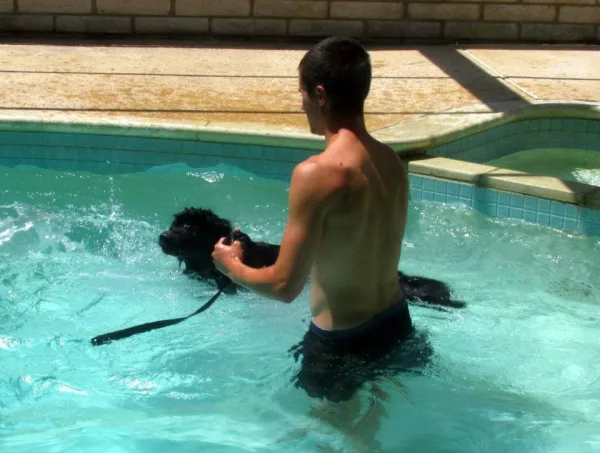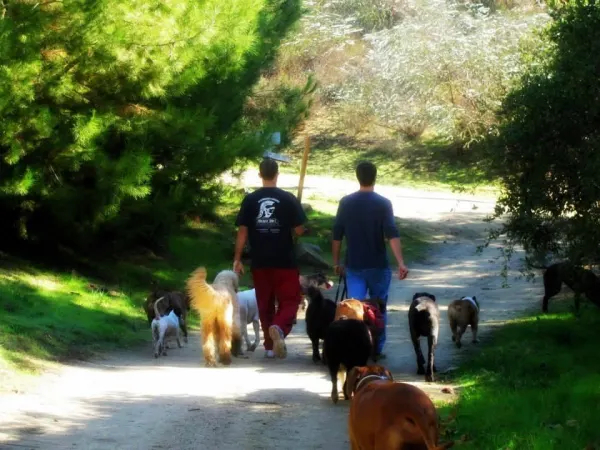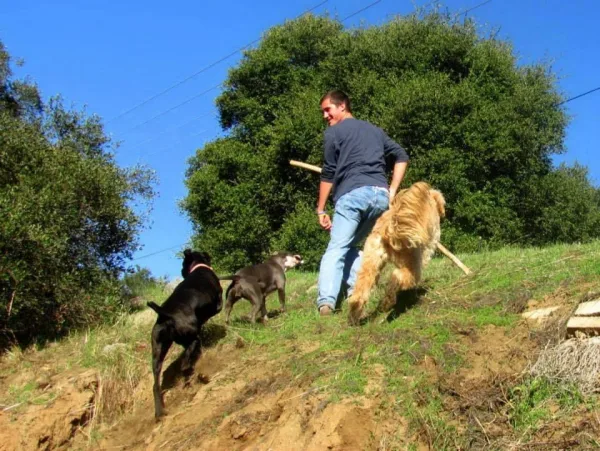State Of Mind Dog Psychology
About
Every dog is completely different each having their own unique individual personality. We connect with them because we love and can relate to this aspect of who they are. This is one of the best gifts and experiences since it is so pure and unconditional. The truth is that our dogs are not humans and humanizing them too much can cause, lead to or exacerbate any behavior problems they are having regardless of how well intentioned we are. Understanding their perspective through dog psychology and being able to communicate in a way that they trust, respect and understand is just as important as the love, joy, affection and laughs we share with them every day. When we understand who they are as a predator, dog and personality is when we truly begin to connect and resolve any issues we're having with them. Knowing how to be, approach and react in the moment enables us to feel confident, calm and in control which in turn helps our dogs to truly feel safe, protected and relaxed.
I have grown up with dogs at different points of my life but adopted my own first personal dog named Murphy when I was 18. If you've ever heard the saying you get the dog you need not the dog you want well my situation was a perfect example of that. To make a long story short Murphy came into my life and challenged me in ways I had never been challenged before. He had a laundry list of issues from pretty major aggression/reactivity to mounting/jumping on just about any living being in his sight (not exaggerating). He pushed me to face many of my own fears, insecurities, frustrations and taught me about patience, understanding, leadership as well as many other things. The relationship and connection that we gained as well as the experience I had is what led me to finding and realizing that I had a natural instinct to help people and their dogs. It's an amazing thing to see people have a more balanced relationship with their dog/s and all of the awesome things that come with it. I have been helping people with their dogs professionally for 12 years now and have helped/rehabilitated thousands of dogs through families/owners and rescue organizations. Many different breeds big and small with all issues ranging from minor to severe. I love teaching people about dogs as well as who they are and need to be with them. The reward is seeing the added happiness and joy people get to experience with their dogs and in their life. Understanding them comes first, then the how and what to do becomes easy and makes sense.
Highlights
Specialties
Private or board lessons
Package interested in
Issues
Photos and videos






No reviews (yet)
Frequently asked questions
What is your typical process for working with a new customer?
The typical process always varies as each situation is different. The best thing to do is to start out with a phone call to be able to talk/connect with the client to answer any questions they have as well as begin to help them understand their situation and what the best next step to take will be. The training and learning starts right away especially since the phone calls are untimed so there's no rush or pressure to be done at any time- this means we could be on the phone for 15-20 minutes or we could be on the phone for an hour and 15-20 minutes you never know where the conversation will go once questions start being answered. This is important because there is a pretty big difference between dog training and dog psychology that most people are unaware of. Dog psychology is a deeper understanding of your dog and your relationship with your dog while dog training is human psychology applied to a dog- both can have their place but when it comes to behavior issues, the reason people often get stuck is because they think that obedience training (sit, stay, down, heel for example) is what's needed when in reality, this is a very surface level way of communicating to our dogs and depending on the dog and issues, can actually make the situation worse.
What education and/or training do you have that relates to your work?
I studied at animal behavior college for a few years but mainly my education has come through my hands on experience working with and handling hundreds to thousands of dogs and packs of up to 60 dogs (all with behavior issues of aggression, fear, anxiety, etc.) at once as well as helping hundreds of owners, rescues and fosters with their dogs in the same time period. I have always had a natural instinct to be able to help and communicate with dogs. Being able to help people to better understand and live a full and happy life with their dog/s is one of the best things life has ever given to me.
Do you have a standard pricing system for your services? If so, please share the details here.
I do, but it can vary from situation to situation. I do home consultations, day evaluations, socialization and rehabilitation from time to time for dogs that absolutely need somewhere to go to be worked with for a while. The price of a home consultation is $300 and is untimed which means I am at the client's home or choice of environment as long as is needed to help them with their situation until they have a solid understanding and confidence in what to do with their dog. Day evaluations are $350- also untimed and this is done at my house/facility. I call it a facility because this is where I have about 10 dogs in the pack and work with dogs here in a home environment. This is usually for more serious situations with higher levels of dog and/or human aggression and I need to see the dog in a neutral environment, away from their owner for a few hours so we get to see who the dog truly is on their own with other dogs and/or people. All the details will be explained to the client before a decision is made of course. Prices for socialization/rehabilitation can be a bit more complicated and vary so this can only be discussed on the phone so it is easier to understand for each individual client.
How did you get started in this business?
When I was 18 I rescued my first personal dog named Murphy who I had to work with all on my own and went from being a dog who was so aggressive people called him "killer" to a dog that within a couple months was helping me break up dog fights of other people's dogs at the dog park and beach. This is actually how I got to start talking to people and teaching them how to resolve the situation instead of creating more chaos and holding on to the trauma for both the people and their dogs. This is when people started coming up to me all the time at the park and or beach with questions and people actually started showing up to the park at the times they knew I was going to be there 😆. Then from there, my family and I bought an 11 acre property in Valley Center, CA that we called Doggy Hydeaway. We turned it into a rehabilitation/boarding facility for dogs and their owners. We had the pack there and started working with many rescue organizations and owner clients offering many different solutions. Dog trainers that wanted to learn more about dog psychology, socialization and the human-dog connection would also come to our facility to experience being with the pack and learn hands on about their own presence and energy while working with their clients and dogs. I could go on and on about it but in a quick summary this is how I got started.
What types of customers have you worked with?
All kinds ranging from owners, rescues, fosters, shelter/humane society employees and volunteers as well as other dog trainers. I have driven as far as Fresno and been asked to fly to Hawaii to help people with their dogs but mainly worked with people from San Diego to many different parts of LA.
Describe a recent event you are fond of.
I love all of the street fairs and markets that happen here in San Diego.
What advice would you give a customer looking to hire a pro in your area of expertise?
I would say first and foremost do your research. There is a ton of information out there as well as claims that each individual's approach, philosophy and way of doing things is the best and most effective. The reality is that every dog, human and situation are completely different and in need of different information and help each time. Understanding what you and your dog/s need in order to truly resolve issues and maintain a balance in the relationship is key. So definitely making calls, feeling the connection with that trainer/behavior specialist and trusting your instincts. It's especially important to feel and trust that the person has you and your dog's best interest at heart, truly cares and wants to help you with your situation.
What questions should customers think through before talking to pros about their needs?
There's a big difference between obedience and behavior work especially when talking about higher levels of fear, aggression, anxiety, etc. Most obedience training is human psychology applied to getting our dogs to do things they already know how to do but for completely different reasons (for example our dogs naturally know how to sit and lie down, but when it's their own choice and they feel emotionally connected to it, they do it because of relaxation, appeasement, submission and other reasons). When we "teach" our dogs to sit for food, a toy and/or high energy praise, we are telling the body to do something it already knows how to do while teaching the brain to be excited (not happy). So obedience can actually often times work against you when you are trying to help a dog overcome their issues and build trust, security and respect in the relationship because too much excitement can and will most likely lead to more intensity of the things you are trying to resolve. Just to be clear- this isn't to say that obedience and commands don't have their place and are pointless- every dog is completely different and some obedience can be great especially for dogs who are a bit shy and have some minor insecurities. I have worked with hundreds-thousands of owners and dogs over the years and one of the most common things that I see are people who send their dogs away for obedience training because they are told that is what their dog needs to "fix" their problems. Then, after spending thousands of dollars they find themselves stuck in the same situation with the same or even worse behavior issues than before. I will never forget a client of mine who had her 2 Rottweilers professionally obedience trained over many years and even sent them away for 5 months on top of all of the sessions at their home, the park, etc. They had obedience competition trophies hanging/standing all over their house- when her dogs were "released" from command, they were in an almost constant hyperactive and highly anxious state of mind which led them to feeling the need to control their environment, people and other dogs with high levels of aggression. After 2 meetings at their house and one of the dogs spending a week at our facility with the pack, most of their problems were completely resolved. They now have a pack of 6 dogs that they walk together and get compliments on how well behaved and calm they are. So without going on too much of a rant, be sure to do your best to educate yourself on some of these things and ask the questions. Also a little tip- if someone tells you that your dog needs to be boarded and trained for however long they suggest without having an in depth conversation, meeting you, your dog and truly evaluating your situation first, it's probably best to talk to someone else who is happy to answer your questions and connect with you on an individual level.